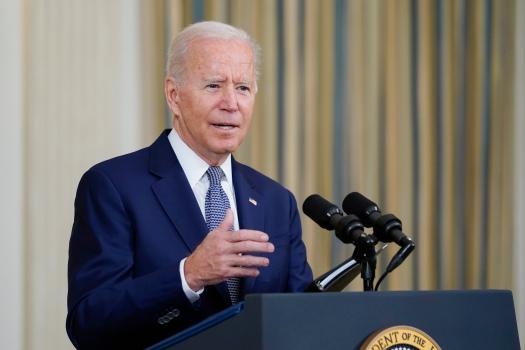Biden Can Pull Liberia Back from the Brink

Joe Biden, President of United States of America
On February 13, 2022, President Joe Biden announced a special presidential delegation to attend Liberia’s bicentennial commemoration of the arrival of the first freed American slaves to Providence Island on the West African coast. They would found the city of Monrovia, named after the then-sitting US President James Monroe, which just 25 years later would become the capital of the newly independent country of Liberia.
In recent decades, however, Liberia has had a troubled history. In the late 20th century, Liberia suffered two civil wars ending only when President Charles Taylor resigned. Nigerian forces subsequently arrested him on an outstanding Special Court for Sierra Leone international warrant. An international tribunal subsequently sentenced him to 50 years for crimes ranging from murder to rape to enslavement.

Stability returned under President (and Nobel laureate) Ellen Johnson Sirleaf, and there was hope that George Weah, a former soccer star, would consolidate and continue the progress. Unfortunately, he has not. Weah backtracked on his pledge — and legal obligation — to establish a war and economic crimes tribunal. At Liberia’s bicentennial, delegation head Dana Banks, to the Biden administration’s credit, condemned Liberia’s growing corruption. “Like many democracies, Liberia still has work to do to seriously address and root out corruption,” she said. “Too many of Liberia’s leaders have chosen their own personal short-term gain over the long-term benefit of their country.”
Like many would-be despots, though, Weah appears not to care. Rather than hold those guilty of war and economic crimes accountable for their actions, he counts them as among his major supporters. Jefferson Koijee, the mayor of Monrovia, for example, stands credibly accused of civil war-era war crimes.
Ultimately, the Liberian people should have a say, but Weah appears determined to subvert democracy. He has harassed Alexander Cummings, a philanthropist and former Coca-Cola executive and his chief political opponent, with a baseless lawsuit designed to keep him off the campaign trail.
As Cummings’s popularity grows, there is danger that Weah and Koijee may grow desperate, and this desperation could lead to violent means to sideline Cummings. Weah may believe he will have plausible deniability should he, like Henry II, ask “Will no one rid me of this turbulent priest?” only to have his supporters interpret his wishes as an order to murder.
Too often, career US ambassadors nearing retirement are obsequious to the leadership in the country in which they serve in order to have a more carefree experience. This was the case with Frank Ricciardone in Egypt and Turkey, and with Donald Yamamoto in Somalia and, unfortunately, it seems to be with Michael McCarthy in Liberia.
US policy in Liberia should be more than to bear witness to the hijacking of Liberian democracy. The Assistant Secretary of State for Democracy, Human Rights, and Labor can identify targets for human rights sanctions. Secretary of State Antony Blinken can then forward those individuals to the president for action under the Global Magnitsky Act. Certainly, Koijee if not Weah today deserve such designation. The State Department has other tools at its disposal. Earlier this month, Blinken sanctioned a number of Somali officials complicit in undermining that country’s elections under authorities granted by the Immigration and Nationality Act; this too should apply to Liberian authorities harassing political opposition.
In addition, Blinken should state clearly that the United States will hold Weah and Koijee personally responsible for the safety and security of both Cummings and his wife and, for that matter, any other opposition politician. Too often, American silence convinces would-be autocrats that they can act with impunity.
Democracy is fragile, but the benefits of freedom vast. When Liberia descended into civil war, a quarter million people died. Its potential could be vast if leaders realize they serve the country rather than vice versa. As Liberia teeters under Weah, it is time for Biden and Blinken to recognize that putting diplomacy first must be more than rhetoric. There is no reason why, with democracy, accountability, and transparency, Liberia cannot thrive.
About the Author: Michael Rubin is a senior fellow at the American Enterprise Institute, where he specializes in Iran, Turkey, and the broader Middle East.A former Pentagon official, Dr. Rubin has lived in post-revolution Iran, Yemen, and both pre- and postwar Iraq. He also spent time with the Taliban before 9/11.Dr. Rubin has a PhD and an MA in history from Yale University, where he also obtained a BS in biology.
